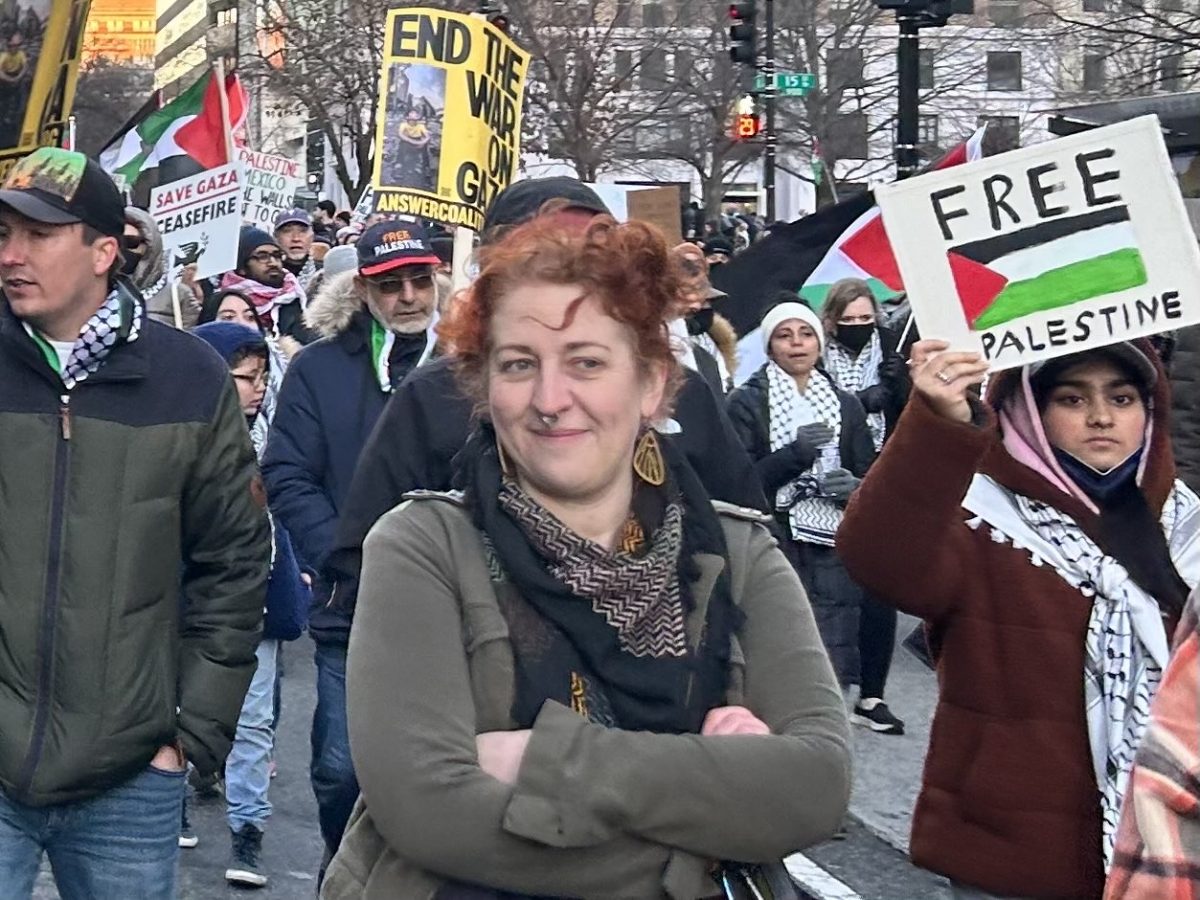To my Emerson College community,
I want to frame this editorial by saying that I am a proud Jew. It is a core part of my identity and the way that I have walked through this world for over 46 years. I spent seven years in Jewish day schools, did a stint as the Jewish Affairs editor at my college newspaper, and (regrettably) participated in a Birthright trip. I am also an anti-Zionist and oppose the apartheid state of Israel that used landmines to blow up Israa University, the last institution of higher learning in Gaza.
I should feel comfortable showing up on campus with all of my identities honored and respected—something laid out by the college in what they call “non-negotiable values,” including “respect and equal treatment for all people of all backgrounds, orientations [and] beliefs.”
I have never felt more connected to my Jewishness and the call to tikkun olam, “repairing the world,” than when standing in solidarity with my Palestinian friends, colleagues, and neighbors.

I have been watching the climate on college campuses around the country with increasing alarm. Attacks on education have been par for the course in states like Florida, where Ron DeSantis directed state schools to ban chapters of Students for Justice in Palestine (SJP), a group that, according to their statement of purpose, “seeks to empower, unify, and support student organizers as they push forward demands for Palestinian liberation & self-determination on their campuses.”
These attacks on the right of student expression are also happening just a few miles away. Brandeis University banned its chapter of SJP, and one state over, Columbia University suspended an SJP chapter as well as a chapter of Jewish Voice for Peace, for which they are being sued by the American Civil Liberties Union.
Here at Emerson, I hope we won’t succumb to the kinds of maneuvering aimed at shutting down discourse in support of Palestine. At the start of the semester, the administration released a caveat to free expression, titled Presidential Statement on Campus Speech and Rhetoric.
In response to this document, the Faculty and Staff for Justice in Palestine, of which I am a member, asked for clarification on several points in an email to President Jay Bernhardt. After almost a month, and on the eve of a Feb. 28 discussion at the faculty assembly, we received a response that fails to address the substantive concerns we raised and which I will echo here.
The statement starts with an idea that I hope we can all endorse. Having dedicated my career to building community and conversation through the Bright Lights Cinema Series, I am in full agreement with the values of “social justice and free expression.” I hosted one of the few spaces for a conversation on Zionism that has been permitted. We welcomed all identities for last month’s screening of “Israelism,” which was a resounding success. I also applaud the very noble goal of “protecting all Emersonians from bias, threats, and intimidation.” However, I do have concerns about a few crucial points that are not clearly defined.
The president’s statement reads: “We have zero tolerance for Anti-Semitism, Islamophobia, or any form of identity-based harassment in our community.”
How does the administration define “Anti-Semitism”? This is an important question in light of definitions that characterize any criticism of the state of Israel as anti-semitic, such as the one by the International Holocaust Remembrance Alliance pushed by the Anti-Defamation League and adopted by some colleges. The Jerusalem Declaration provides an alternate definition of anti-semitism as “discrimination, prejudice, hostility or violence against Jews as Jews (or Jewish institutions as Jewish)” with clear caveats that “evidence-based criticism of Israel as a state” are not anti-semitic. This definition has been widely adopted by scholars for “providing clear guidance to identify and fight anti-semitism while protecting free expression.”
As an academic institution, we should take a stand against the attacks on other academic institutions, whether that’s the destruction of higher learning institutions in Gaza or the rights of free speech among students, faculty, and staff here at home.
The president’s statement continues to say that: “Explicit calls for physical violence against people or groups based on their religious, national, or other protected identities are not consistent with our values or community standards.”
On its face, this is certainly an idea that should be easy to support. However, given what I’ve witnessed on other campuses, it raises some important questions: What is considered a “call for physical violence?” Who determines this? And what are the repercussions for violating this policy? There is a significant amount of disingenuous framing of several slogans used by those who are aligned with the movement in support of Palestinian freedom as a call for violence.
What person or body determines what speech falls into this category and therefore is “not protected by our Statement on Freedom of Expression?”
As a person of conscience committed to the care and well-being of all members of the Emerson College community, I am deeply invested in the “functioning of the College as a safe environment for students and other community members.” However, I am also concerned that without clarity, oversight, and a transparent process, such rhetoric could be used to silence members of our community who have a right to express political beliefs—even those that may not be endorsed by the administration.
I would love to see the administration of the institution where I have built my career of almost 17 years take a clear stand in protecting freedom of speech and expression. I want assurances that I will not be disciplined when I join our students gathering in the streets around Boylston and Tremont, adding my voice to theirs when they say a prayer for peace, for a future in which there is one state with equality for citizens of all ethnoracial backgrounds: “From the river to the sea, Palestine will be free.”